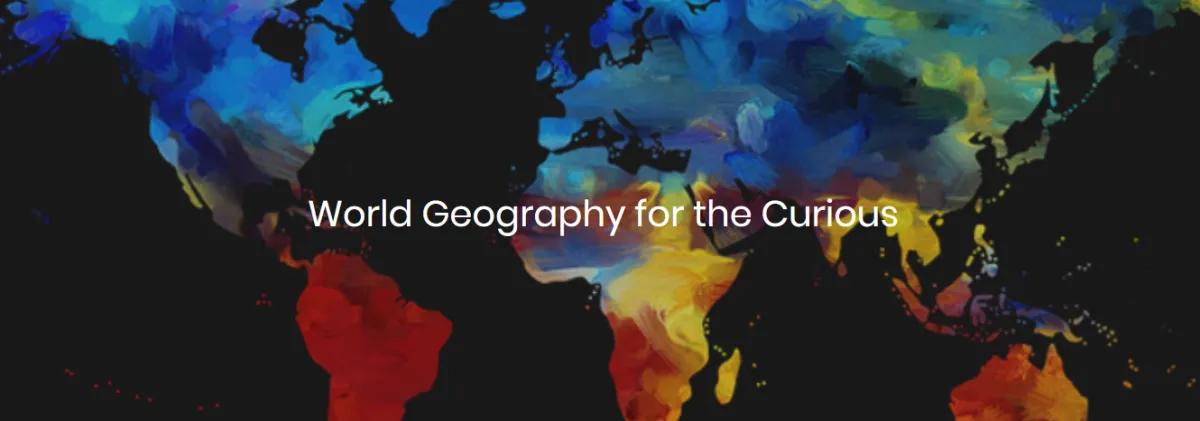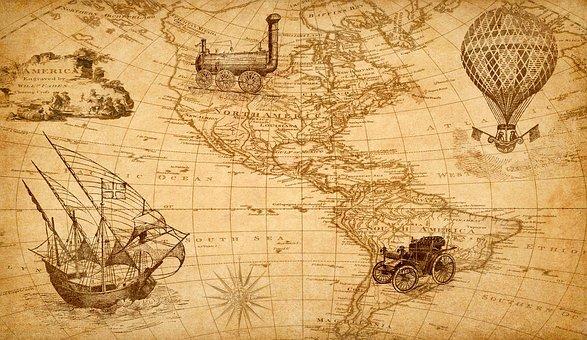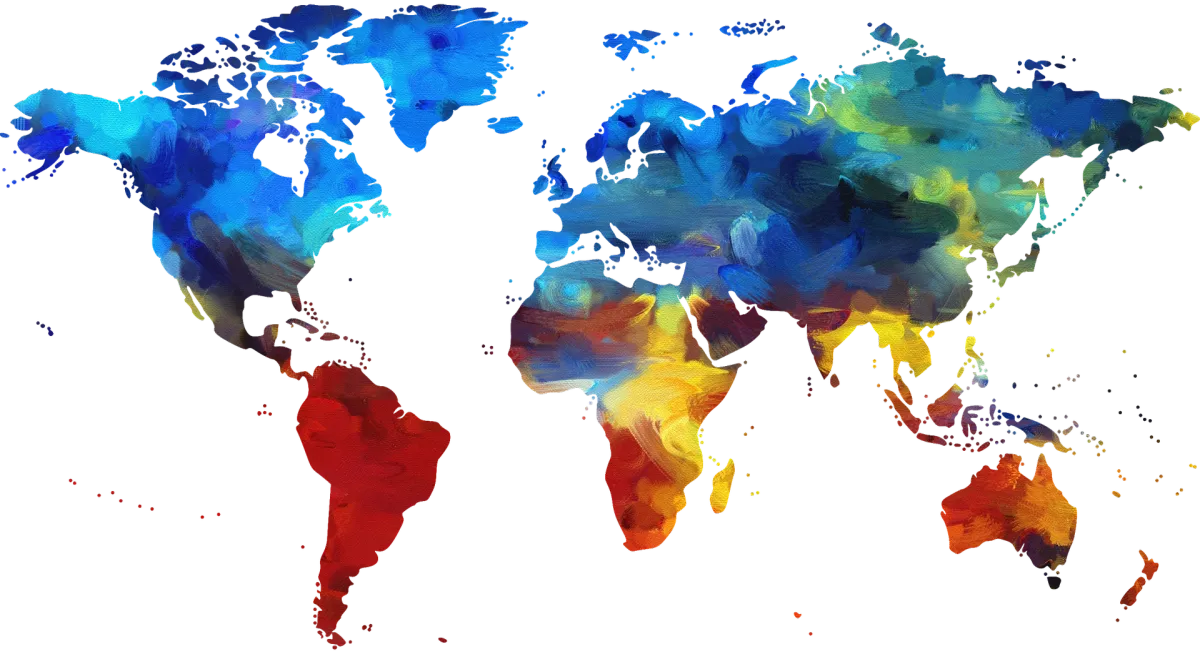
On Demand
Ages: 10+
50 min class time
3-9 learners min per class
26 Week Course
13 Wk Blocks (Pts 1 & 2)
33 Week Course
Full 33 Week Course-
Cost: $50 per 6 months
All Access PREMIUM
$59/month or $300/yr
First Week Free!
Cancel Anytime
Homework Discussion via Email Included!
In Development
Try out All Access Premium and download Free Teacher's Corner Products: Course Syllabus & First Week PPT/ Teacher's Outline
Course Description
Text: World Geography by McDougal Little (Houghton Mifflin) Student Edition- ISBN 0618689982
This course covers the physical and human geography of the earth- its inner workings and climates, as well as the diverse cultures and their interactions, patterns and connections with the environment. Maps, charts and tables continue to illustrate our understanding of the natural world and will be heavily resourced. Additional challenge and enrichment activities, video links and topics/ literature specific to geography and man’s relationship with nature are included for your reference as well for age-appropriate study of crafts/ recipes/ videos to further supplement your study during outside class time!
Foundations of Geography
United States and Canada
Latin America
Europe
Russia and the Republics
Africa
West Asia
South Asia
East Asia
Southeast Asia, Oceania & Antarctica
Semester Live In Person
& ONLINE Live via Zoom
On Demand

Class time will be spent discussing the regional physical and human geography as well as today's issues through an interactive multimedia power point presentation, themed activities/ projects, cultural food tasting, supplemental videos, interactive Kahoot quizzes and a Geography Bee. The last class is reserved for celebration- final presentations and the Bee!
'Homework' consists of reading/ perusing the selected reference text (World Geography by McDougal Little), working on suggested challenge activities and preparation of a final presentation during the last class. For the reference text, the goal is familiarity and building connections to previous knowledge- try and peruse the content weekly and it will prepare your learner for our class discussion.
Additional challenge and enrichment activities, video links and topics/ literature specific to geography are included for your reference to further supplement your study during outside class time. Challenge Activities are not required; however, I’d love for the students to share in class if they chose to complete them! No background knowledge is required. Comprehension of the content is assessed as we progress through the course via weekly reviews, narrations and suggested essay topics every week- including occasional presentations.
Part 1/ Fall Semester Class Experience-
Week One: Themes & Tools of Geography, Relative vs. Absolute Location; Kinds of maps: relief, political, physical, topographic; Atlas; Reading a map: compass, legend, scale, color; Geocaching/ Letterboxing
Week Two: Solar System; Pangea; Inner Earth: Core, Mantle, Crust; Atmosphere, Lithosphere, Hydrosphere, Biosphere; Landforms; Hydrologic Cycle; Hotspots, Plate Tectonics: Divergent, Subduction, Convergent, Transformative; Seismographs, Richter Scale, Epicenter; Mechanical and Chemical Weathering; Erosion: Water, Wind & Glacial
Week Three: Hemispheres, Solstice, Equinox; Weather vs. Climate; Precipitation: Frontal, Orographic, Convectional; Climate Factors: Wind & Ocean Currents, Latitude, Altitude; World Climates; Factors to Climate Change; Ecosystems, Biomes
Week Four: Innovation, Diffusion, Acculturation, Language Families, World Religions; Dynamic Populations
Week Five: Urban Land Planning: urbanization, megalopolis, CBD; Types of Production; Opportunity Cost, Specialization of Labor; Levels of Economic Opportunity; Natural Resources: Renewable/ Nonrenewable; Infrastructure
Week Six: North America Physical Geography- Rocky Mountains, Appalachians, Great Plains; Continental Divide; St. Lawrence Seaway, Intercoastal Waterway, Lock Systems; Tornado Alley; Oregon & Santa Fe Trails; Transcontinental Railroad
Week Seven: North American Human Geography American Colonization: Early Settlements, Columbian Exchange; Wars: French/ Indian, Revolutionary, Civil; Lands: 13 Colonies, Louisiana Purchase, Western Expansion; Agrarian, Industrialization, Information Ages; Democratic Republic, Free Market Economy; Subregions: New England, South, Midwest, West; Immigration: Melting Pot, Cultural Diversity
Week Eight: Canada Human Geography & Today's Issues- Inuit, Vikings; Hudson Bay Company; Dominion of Canada, Provinces, Parliamentary Government; Yukon Gold Rush; Primary Economic Industries: Services, Manufacturing, Agriculture; Tariffs, Imports, Exports; 50th Parallel, Totems; Subregions: Atlantic, Core, Prairie, Pacific and Territories; Terrorism: 9/11; Urban Sprawl
Week Nine: Latin America Physical Geography- New Spain; Simon Bolivar; Andes Mountains, Amazon River; Llanos, Cerrado, and Pampas; Caribbean: Bahamas, Lesser & Greater Antilles; Medicinal Plants of the Rainforest; Climate Zones of S. America; Slash & Burn Agriculture, Terracing; Urbanization & Tourism
Week Ten: Latin America Human Geography & Today's Issues- Nazca, Olmec, Mayan, Spanish Mission, African, Inca Heritage; Reggae, Calypso, Samba, Capoeira; Mercosur Trade Group; Treaty of Tordesillas; Carnival, Rain Forest and Resources; Political History: Revolutions & Governments; Panama Canal; Giving Citizens a Voice: Coup de-etat, Junta, Caudilla
Week Eleven: European Physical Geography- Peninsulas: Balkan, Iberian, Scandinavian, Italian, Jutland; Mountain Ranges: Apennine, Alps, Pyrenees, Balkan; North Europe Plain, Land of the Midnight Sun; Dark Forest; North Atlantic Drift, Mistral, Sirocco; Peat, Fjord, Acid Rain; Dutch Seawork, Dike, Polder, Terpen; Venice: Gondolas
Week Twelve: European Human Geography & Today's Issues- Civilizations: Rome, Greece, Byzantine; Christianity and Islam Influence: Crusades, Renaissance; Bubonic Plague; Charlemagne, Martin Luther, Bonaparte; WW2- Nazis, Axis, Allies, Berlin Wall; Nordic Countries: British Imperialism, Industrialization, Social Welfare; Eastern Europe: Balkanization, Satellite Nations; European Union; Yugoslavia: Serbs, Croatia, Ethnic Cleansing
Week Thirteen: Celebration- Final Presentations and Geography Bee!
Pt 2/ Winter Semester Class Experience-
Week One: Ural & Caucus Mountains; Kamchatka Peninsula; Caspian & Aral Seas, Lake Baikal; Siberia: Tundra, Permafrost, Taiga, Steppe, Continentality; Trans-Siberian Railroad
Week Two: Baltic Republics, Russian Revolution, USSR, Collective Farms; Cold War, Economic Challenges: Command to Market, Caspian Sea- Land of Flames; Transcaucasia, Chernobyl, Nuclear Legacy: Political, Economic and Environmental Challenges
Week Three: Rift Valley, Sahara Desert, Aquifer, Oasis, Ibn Butatta, Savannah, Serengeti Plains, Desertification, Aswan High Dam, Olduvai Gorge, Suez Canal, Colonization of Africa; Swahili, Aids
Week Four: Ancient Egyptians, Nile River; Souks, Medina, Fang Sculpture; Congo River, Epidemics: Malaria, Cholera, Tuberculosis, HIV/ Aids; Colonialism Outcomes: Political Unrest & Ethnic Tension: Apartheid, Nelson Mandela
Week Five: Jordan River & Rift Valley, Golan Heights, Dead Sea, Tigris & Euphrates Rivers, Petra; Petroleum, Oil Spills; Iceberg Project, Qanat, Drip-irrigation, Noria, Wadi, Desalinization, Fossil Water, National Water Carrier Project
Week Six: Theocracy, Islam: Five Pillars, Ramadan, Sunni and Shiite Muslims; OPEC, Israel: Jerusalem, Palestine, PLO, Six Day War 1967, Israel: West Bank, Gaza Strip; Political & Religious Turmoil; Masada
Week Seven: Subcontinent; Himalayas, Mt. Everest, Indus River Valley, Deccan Plateau, Sri Lanka, Maldives, Atolls; Indo- Gangetic Plain, Climate: Monsoon; Hinduism: Ganges River, Dharma, Karma; Feni River Dam
Week Eight: Hinduism: Caste System; Muslim Regions: Bangladesh & Pakistan; Buddhism: Siddhartha Gautama; Mahatma Gandhi, Population Pyramid; Monsoons, Poverty; Education Demands, Illiteracy; India, China or Pakistan- Territorial Nuclear Threat
Week Nine: Great Wall, Taklimakan & Gobi Deserts, Dinosaur Fossils; Port Cities: Macao, Hong Kong, Hainan Island, Korean Peninsula; Yellow & Yangtze Rivers, Grand Canal, Three Gorges Dam; Yuan Dynasty Invasion Japan, Typhoon, Kamikaze; Tibet: Dalai Lama, Autonomous Zones; Landfills: Reclaimed Land
Week Ten: Dynasties, European Spheres of Influence, Boxer Rebellion, People’s Revolution, Communist Party, Chairman Mao; Confucianism, Taoism, Buddhism; Population Growth; Mongolia; Taiwan; Korean Peninsula; Japan; Ring of Fire: Earthquake, Tsunami,
Warning Buoy, Seismic Building Construction
Week Eleven: Indonesia, Australia, Great Barrier Reef, New Zealand, Antarctica, Polynesian Islands, Archipelago, Rain Shadow, Monsoon, Early Navigation Techniques; Outrigger Canoe vs. Voyaging, Invasive Species: Rabbits, Bikini Atoll: Nuclear Testing
Week Twelve: French Indochina, Cambodia: Angkor Wat, Oceania: Micronesia, Melanesia, Polynesia; Australia: British Colonization, Aborigines, Indigenous People, Terra Nullius, Assimilation, Stolen Generation; New Zealand: Maori Haka; Antarctica: Shackleton, Endurance
Week Thirteen: Final Presentations
ONLINE LIVE via Zoom Class Experience:
During this 26 or 33-week course, class time will be spent discussing the physical and human geography as well as today's issues relevant to each region of our world. Cultural literacy terms, socio/economic advances, religions, languages, individuals, and environmental changes which define each region will be discussed through an interactive multimedia power point presentation, Edpuzzle and supplemental videos as well as Kahoot review games will be integrated throughout.
No background knowledge is required. The bulk of weekly homework consists of reading the text, World Geography by McDougal Little, and occasional presentations of today's issues around the world. Expect 0-1 hrs. of out of class time prep. Weekly discussion, writing topics & activity ideas are given to apply what we have discussed; however, they are not required.
Additional literature of historical fiction, classics and biographies are given as individual reading or family read aloud suggestions and supplemental activity ideas are included for your reference and use. A course syllabus will be available upon registration. Time off for national holidays is expected and if there is a week your learner isn't able to make class, recordings will be available for them to watch at their convenience!
Self-paced FLEX
Full 33 Week
Course Description

Class Experience-
In this 33-week flex schedule class, there will be no set time for meeting. Each week students will be given a reading assignment from the text: World Geography by McDougal Little, video with multi-media presentation, discussion/ essay questions, and supplemental video/ activity links designed to enrich their study of the regional physical and human geography as well as today's issues .
No background knowledge is required. The bulk of weekly homework consists of reading the text, World Geography by McDougal Little, and occasional presentations of today's issues around the world. Expect 0-1 hrs. of out of class time prep. Weekly discussion, writing topics & activity ideas are given to apply what we have discussed; however, they are not required.
Additional literature of historical fiction, classics and biographies are given as individual reading or family read aloud suggestions and supplemental activity ideas are included for your reference and use. A course syllabus will be available upon registration. Time off for national holidays is expected and if there is a week your learner isn't able to make class, recordings will be available for them to watch at their convenience! Weekly topics of discussion are listed above in the Online Live Course option.
Week One: Themes& Tools of Geography, Relative vs. Absolute Location; Satellite Imagery Surveying; Types of Maps
Week Two: Solar System; Pangea; Inner Earth: Core, Mantle, Crust; Atmosphere, Lithosphere, Hydrosphere, Biosphere; Landforms; Hydrologic Cycle; Hotspots, Plate Tectonics: Divergent, Subduction, Convergent, Transformative; Seismographs, Richter Scale, Epicenter; Mechanical and Chemical Weathering; Erosion: Water, Wind & Glacial
Week Three: Hemispheres, Solstice, Equinox; Weather vs. Climate; Precipitation: Frontal, Orographic, Convectional; Climate Factors: Wind & Ocean Currents, Latitude, Altitude; World Climates; Factors to Climate Change; Ecosystems, Biomes
Week Four: Innovation, Diffusion, Acculturation, Language Families, World Religions; Dynamic Populations; Forms of Government; Political Systems; United Nations
Week Five: Urban Land Planning: urbanization, megalopolis, CBD; Types of Production; Opportunity Cost, Specialization of Labor; Levels of Economic Opportunity; Natural Resources: Renewable/ Nonrenewable; Infrastructure
Week Six: Rocky Mountains, Appalachians, Great Plains; Continental Divide; St. Lawrence Seaway, Intercoastal Waterway, Lock Systems; Tornado Alley; Oregon & Santa Fe Trails; Transcontinental Railroad
Week Seven: American Colonization: Early Settlements, Columbian Exchange; Wars: French/ Indian, Revolutionary, Civil; Lands: 13 Colonies, Louisiana Purchase, Western Expansion; Agrarian, Industrialization, Information Ages; Democratic Republic, Free Market Economy; Subregions: New England, South, Midwest, West
Week Eight: Inuit, Vikings; Hudson Bay Company; Dominion of Canada, Provinces, Parliamentary Government; Yukon Gold Rush; Primary Economic Industries: Services, Manufacturing, Agriculture; NAFTA, Tariffs, Imports, Exports; 50th Parallel, Totems; Subregions: Atlantic, Core, Prairie, Pacific and Territories
Week Nine: Terrorism: 9/11; Urban Sprawl; Immigration: Melting Pot, Cultural Diversity; Depletion of Resources: Aquifers
Week Ten: New Spain; Simon Bolivar; Andes Mountains, Amazon River; Llanos, Cerrado, and Pampas; Caribbean: Bahamas, Lesser & Greater Antilles; Medicinal Plants of the Rainforest; Climate Zones of S. America; Slash & Burn Agriculture, Terracing; Urbanization & Tourism
Week Eleven: Political History: Revolutions & Governments; Panama Canal; NAFTA: Mayan, Spanish Mission, African, Inca Heritage; Reggae, Calypso, Samba, Capoeira; Mercosur Trade Group; Treaty of Tordesillas; Carnival
Week Twelve: Rain Forest and Resources: Deforestation, Biodiversity, Debt for Nature Swap; Giving Citizens a Voice: Coup de-etat, Junta, Caudilla; Income Gap: Free market, Democracy
Week Thirteen: Peninsulas: Balkan, Iberian, Scandinavian, Italian, Jutland; Mountain Ranges: Apennine, Alps, Pyrenees, Balkan; North Europe Plain, Land of the Midnight Sun; Dark Forest; North Atlantic Drift, Mistral, Sirocco; Peat, Fjord, Acid Rain; Dutch Seawork, Dike, Polder, Terpen; Venice: Gondolas
Week Fourteen: Civilizations: Rome, Greece, Byzantine; Christianity and Islam Influence: Crusades, Renaissance; Bubonic Plague; Charlemagne, Martin Luther, Bonaparte; WW2- Nazis, Axis, Allis, Berlin Wall; Nordic Countries: British Imperialism, Industrialization, Social Welfare; Eastern Europe: Balkanization, Satellite Nations; European Union
Week Fifteen: Yugoslavia: Serbs, Croatia, Ethnic Cleansing; Air and Water Pollution: Causes and Solutions; EU: Seen/Unseen Consequences, Brexit
Week Sixteen: Ural & Caucus Mountains; Kamchatka Peninsula; Caspian & Aral Seas, Lake Baikal; Siberia: Tundra, Permafrost, Taiga, Steppe, Continentality; Trans-Siberian Railroad
Week Seventeen: Baltic Republics, Czar, Russian Revolution, Cold War, USSR, Command Economy, Collective Farm; Yurts, Supra, Banya, Dachas; Caspian Sea- Land of Flames; Transcaucasia, Nomadic Lifestyle; Chernobyl, Nuclear Fallout
Week Eighteen: Caucasus Unrest: Chechnya, Georgia, Armenia and Azerbaijan; Economic Challenges: Command Economy to Market, Privatization, Distance Decay, Organized Crime; Nuclear Legacy: Political, Economic and Environmental Challenges
Week Nineteen: Rift Valley, Sahara Desert, Aquifer, Oasis, Ibn Butatta, Savannah, Serengeti Plains, Desertification, Aswan High Dam, Olduvai Gorge, Suez Canal, Colonization of Africa; Swahili, Aids
Week Twenty: Ancient Egyptians, Carthage, Nile River, Famine; Souks, Medina, Stateless Societies, Ashanti: Kente Cloth; Bantu, Congo River, David Livingstone & Henry Stanley, Berlin Conference; Fang Sculpture; Great Zimbabwe, Mutapa Empire; Apartheid, Nelson Mandela
Week Twenty-one: Commodities, Diverse Economic Systems; Epidemics: Malaria, Cholera, Tuberculosis, HIV/ Aids; Colonialism Outcomes: Political Unrest & Ethnic Tension
Week Twenty-two: Jordan River & Rift Valley, Golan Heights, Dead Sea, Tigris & Euphrates Rivers, Petra; Petroleum, Oil Spills; Iceberg Project, Qanat, Drip-irrigation, Noria, Wadi, Desalinization, Fossil Water, National Water Carrier Project
Week Twenty-three: Theocracy, Islam: Five Pillars, Ramadan; OPEC, Souk; Israel: Jerusalem, Palestine, PLO, Six Day War 1967, Kurds, Sunni and Shiite Muslims; Iraq: Operations Enduring Freedom & Operation Iraqi Freedom
Week Twenty-four: Stateless Nations: Kurds, Palestinians; Economic Diversity- Strategic Commodities, Agricultural Improvements, Developing Human Resources; Israel: West Bank, Gaza Strip; Political & Religious Turmoil; Masada
Week Twenty-five: Subcontinent; Himalayas, Mt. Everest, Indus River Valley, Deccan Plateau, Sri Lanka, Maldives, Atolls; Indo- Gangetic Plain, Climate: Monsoon; Hinduism: Ganges River, Dharma, Karma; Feni River Dam
Week Twenty-six: Mahatma Ghandi; Hinduism: Caste System; Muslim Regions: Bangladesh & Pakistan, Sultans, Ramadan, Purdah, Punjabi, Bengali; Micro-credit; Sherpa; Buddhism: Siddhartha Gautama, Mandalas
Week Twenty-seven: Population Pyramid; Summer and Winter Monsoons, Poverty; Education Demands, Illiteracy; Maharajah Rule, Kashmir: India, China or Pakistan- Territorial Nuclear Threat
Week Twenty-eight: Great Wall, Taklimakan & Gobi Deserts, Dinosaur Fossils; Port Cities: Macao, Hong Kong, Hainan Island, Korean Peninsula; Yellow & Yangtze Rivers, Grand Canal, Three Gorges Dam; Yuan Dynasty Invasion Japan, Typhoon, Kamikaze; Tibet: Dalai Lama, Autonomous Zones; Landfills: Reclaimed Land
Week Twenty-nine: Dynasties, European Spheres of Influence, Boxer Rebellion, People’s Revolution, Communist Party, Chairman Mao; Economic Reform: Trade Agreements; Confucianism, Taoism, Buddhism; Population Growth; Mongolia; Taiwan: Economic Tiger, Pacific Rim; Korean Peninsula; Japan: Shogun, Samurai, Daimyo; Mt. Fuji, Kabuki Theater
Week Thirty: Ring of Fire: Tectonic Plates: Subduction Zone, Richter Scale, Earthquake, Tsunami, Warning Buoy, Seismic Building Construction; Economic Policies- Isolationism, Westernization, Industrialization; Four Tigers, Labor, Capital, Technology; Population Controls, Global Warming
Week Thirty-one: Indonesia, Australia, Great Barrier Reef, New Zealand, Antarctica, Polynesian Islands, Archipelago, Rain Shadow, Monsoon, Early Navigation Techniques; Outrigger Canoe vs. Voyaging, Invasive Species: Rabbits, Bikini Atoll: Nuclear Testing
Week Thirty-two: French Indochina, Vietnam War; Cambodia: Angkor Wat, Mandalas; ASEN; Krakatoa; Oceania: Micronesia, Melanesia, Polynesia; Australia: Cook, British Colonization, Aborigines; New Zealand: Maori, Haka; Antarctica: Shackleton, Endurance, Research Stations
Week Thirty-three: Australia: Aborigines, Indigenous People, Terra Nullius, Assimilation, Stolen Generation; Industrialization: Push/Pull Factors; Challenges; Climate Change Arguments
ALL ACCESS PREMIUM FLEX INCLUDES
First Week FREE
$59/ month- cancel anytime
Perfect for families with multiple learners!
Homework Discussion via Email Included!
Access to ANY of my FLEX courses-
World History, Economics, Law and World Geography!
Download Free Teacher's Corner Products:
Course Syllabus & First Week PPT/ Teacher's Outlines
©2024 by ThrowinMarshmallows
